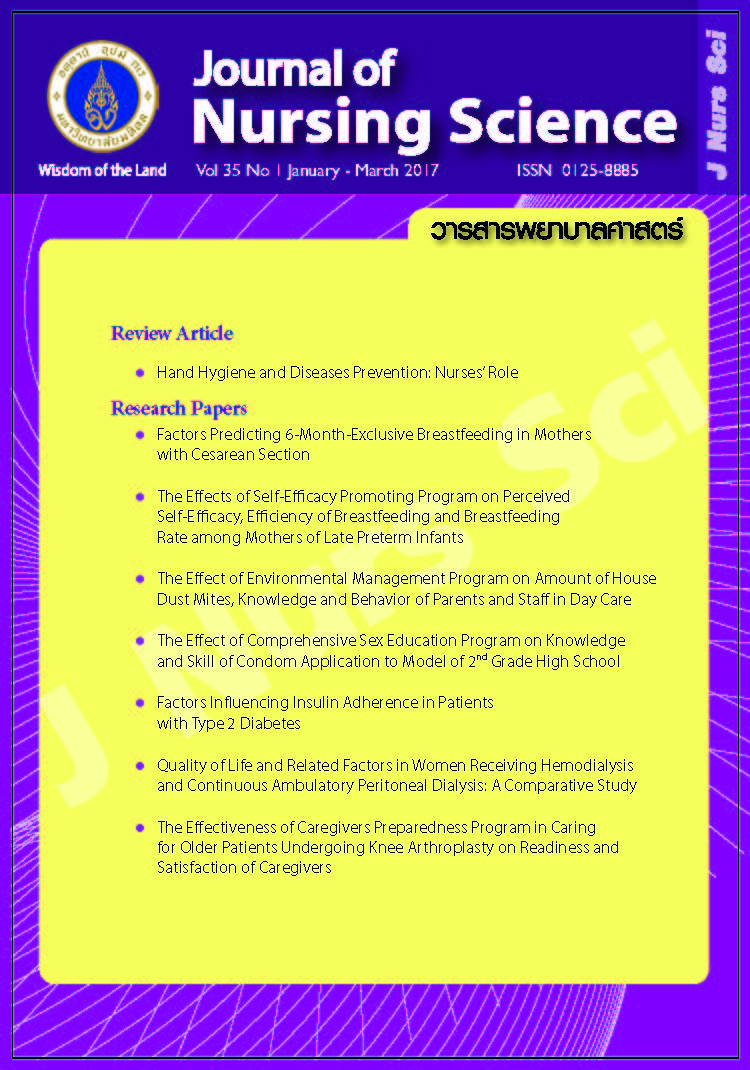Factors Predicting 6-Month-Exclusive Breastfeeding in Mothers with Cesarean Section
Main Article Content
Abstract
Abstract
Purpose: This study aimed to determine the relative contributions of exclusive breastfeeding at discharge, breastfeeding self-efficacy, previous breastfeeding experience, and employment status to 6-month exclusive breastfeeding in mothers with Cesarean Section.
Design: Predictive research design.
Methods: Seventy five mothers who delivered by Cesarean Section at one university hospital in Bangkok, Thailand; and previously enrolled in earlier study were recruited into this study. During August – September 2013, the subjects were interviewed by telephone. Instruments used to obtain data including the Personal Data Interviewing Form, the Breastfeeding Self-Efficacy Scale-Short Form, the Baby-Feeding Records, and Infant-Feeding Interviewing Form. Percentage, mean, standard deviation, and logistic regression were used in data analysis.
Main findings: Exclusive breastfeeding rate decreased from 56% at the beginning to 18.7% within 6-month period. Logistic regression revealed that exclusive breastfeeding at discharge, breastfeeding self-efficacy, previous breastfeeding experience, and employment status could explain 19% of variance (R2 = .19, p < .05) in 6-month-exclusive breastfeeding of the mothers with Cesarean Section. However, only previous experience was a significant predictor [Exp (B) = 6.694, 95% CI = 1.371-32.692].
Conclusion and recommendations: Experienced breastfeeding mother with Cesarean Section is more likely to get success in later pregnancy. Therefore, maternal support to breastfeeding is necessary and beneficial not only in the present but also the subsequent gestation.
ปัจจัยทำนายการเลี้ยงลูกด้วยนมแม่อย่างเดียว 6 เดือน ในมารดาผ่าตัดคลอด
บทคัดย่อ
วัตถุประสงค์: การศึกษาเชิงทำนายนี้ต้องการศึกษาผลของการเลี้ยงลูกด้วยนมแม่อย่างเดียวก่อนจำหน่ายความเชื่อมั่นในสมรรถนะของตนเองในการเลี้ยงลูกด้วยนมแม่ ประสบการณ์การเลี้ยงลูกด้วยนมแม่ และการทำงานต่อการเลี้ยงลูกด้วยนมแม่อย่างเดียว 6 เดือน ในมารดาที่คลอดโดยการผ่าตัด
รูปแบบการวิจัย: การวิจัยเชิงทำนาย
วิธีดำเนินการวิจัย: กลุ่มตัวอย่างเป็นมารดาที่คลอดโดยการผ่าตัด ณ โรงพยาบาลมหาวิทยาลัยแห่งหนึ่งในกรุงเทพมหานคร จำนวน 75 ราย ซึ่งเป็นกลุ่มตัวอย่างในการศึกษาก่อนหน้านี้ เก็บข้อมูลต่อเนื่องโดยโทรศัพท์สัมภาษณ์มารดาระหว่างเดือนสิงหาคม-กันยายน 2556 เก็บรวบรวมข้อมูลโดยใช้แบบสัมภาษณ์ข้อมูลส่วนบุคคล แบบสอบถามการรับรู้สมรรถนะในตนเองเกี่ยวกับการเลี้ยงลูกด้วยนมแม่ แบบบันทึกการให้อาหารทารก และแบบสัมภาษณ์ทางโทรศัพยท์เกี่ยวกับชนิดของอาหารทารกในระยะ 6 เดือนแรกวิเคราะห์ข้อมูล โดยคำนวณร้อยละ ค่าเฉลี่ย ส่วนเบี่ยงเบนมาตรฐาน และสถิติถดถอยพหุโลจิสติกส์
ผลการวิจัย: อัตราการเลี้ยงลูกด้วยนมแม่อย่างเดียวในกลุ่มตัวอย่างลดลงจากร้อยละ 56 เหลือร้อยละ 18.7 ภายในระยะเวลา 6 เดือนหลังคลอด ผลการวิเคราะห์ด้วยสถิติถดถอยพหุโลจิสติกส์พบว่า การเลี้ยงลูกด้วยนมแม่อย่างเดียวก่อนจำหน่าย ความเชื่อมั่นในสมรรถนะของตนเองในการเลี้ยงลูกด้วยนมแม่ ประสบการณ์การเลี้ยงลูกด้วยนมแม่ และการทำงานสามารถอธิบายความผันแปรของการเลี้ยงลูกด้วยนมแม่อย่างเดียว 6 เดือนได้ร้อยละ 19 (R2 = .19, p < .05) แต่มีเพียงประสบการณ์ในการเลี้ยงลูกด้วยนมแม่ในบุตรคนก่อนที่มีผลอย่างมีนัยสำคัญทางสถิติ [Exp (B) = 6.694, 95% CI = 1.371-32.692]
สรุปและข้อเสนอแนะ: ประสบการณ์ในการเลี้ยงลูกด้วยนมแม่ในบุตรคนก่อนเป็นปัจจัยสำคัญที่ทำให้มารดาที่คลอดโดยการผ่าตัดสามารถเลี้ยงลูกด้วยนมแม่อย่างเดียวได้นาน 6 เดือนในบุตรคนถัดมา ดังนั้น การสนับสนุนให้มารดาเลี้ยงลูกด้วยนมแม่จึงมีความสำคัญ และช่วยเพิ่มโอกาสสำเร็จในครรภ์ถัดไป
คำสำคัญ: มารดาผ่าตัดคลอดเลี้ยงลูกด้วยนมแม่อย่างเดียว ประสบการณ์ในการเลี้ยงลูกด้วยนมแม่ ความเชื่อมั่นในสมรรถนะของตนเองในการเลี้ยงลูกด้วยนมแม่ การทำงาน
Article Details
Copyright Notice: Nursing Science Journal of Thailand has exclusive rights to publish and distribute the manuscript and all contents therein. Without the journal’s permission, the dissemination of the manuscript in another journal or online, and the reproduction of the manuscript for non-educational purpose are prohibited.

Disclaimer: The opinion expressed and figures provided in this journal, NSJT, are the sole responsibility of the authors. The editorial board bears no responsibility in this regard.


